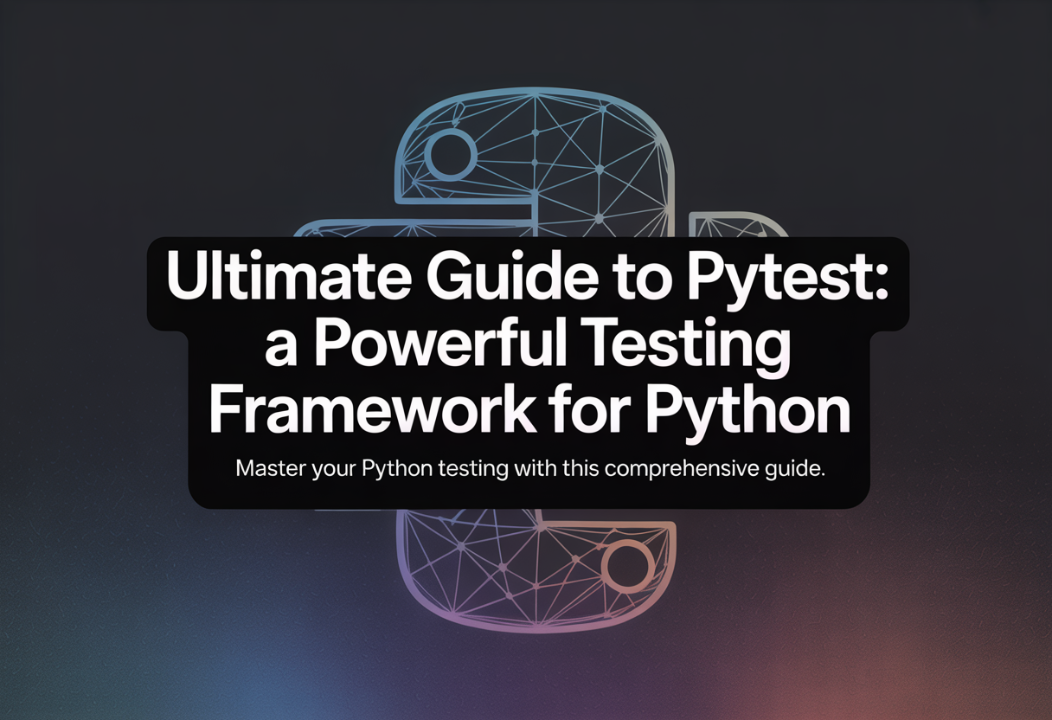 TESTING FRAMEWORK
TESTING FRAMEWORK Ultimate Guide to PyTest: A Powerful Testing Framework for Python

Have you ever struggled with unreliable testing frameworks that make automation more of a headache than a solution? If you're a QA engineer, chances are you've explored multiple testing tools only to find that many lack flexibility, scalability, and the efficiency required for modern software development. That’s where PyTest shines.
In my years of experience in quality assurance, one tool that has consistently delivered is PyTest. Whether working on unit tests, integration tests, API automation, or even UI testing, PyTest offers a robust, elegant, and powerful solution for writing and executing tests efficiently.
Let's dive deep into how PyTest works, why it should be your go-to testing framework, and how you can leverage it to create automated test suites that make debugging a breeze.
What is PyTest?
If you've worked in Python testing, you've likely heard about PyTest. But what makes it so special?
PyTest is an open-source framework that simplifies test writing with its user-friendly syntax, dynamic test discovery, and extensive plugin support. Unlike Unittest, which can feel rigid and verbose, PyTest follows Python’s philosophy—"Simple is better than complex."
Key Features of PyTest:
- Automatic test discovery: Finds test cases with minimal setup.
- Fixture mechanism: Reduces redundancy, making tests reusable and scalable.
- Easy parameterization: Enables multiple test scenarios with a single function.
- Powerful debugging: Integrated reporting and assertion mechanisms for efficient error tracking.
PyTest is built for QA professionals who want clean, maintainable, and scalable tests without unnecessary overhead.
Why Choose PyTest for QA Automation?
After working with various testing frameworks, PyTest stands out because it eliminates many bottlenecks associated with automated testing.
Advantages Over Traditional Testing Frameworks:
✅ Simple syntax: No unnecessary boilerplate code—just write functions! ✅ Better fixture management: Unlike Unittest, PyTest allows advanced dependencies handling through fixtures. ✅ Multi-test execution: PyTest lets you run thousands of tests efficiently without managing separate test runners.
Real-world scenario: Imagine automating API testing. Instead of manually setting up test data, PyTest lets you create fixtures that handle repeated setups effortlessly.
Setting Up PyTest
One of the reasons I love PyTest is that it takes less than a minute to set up.
Installation Steps:
Open your terminal and run:
bash
pip install pytest
And that’s it! You're ready to go.
Writing Your First PyTest Script
Let’s write a simple PyTest script to check if basic arithmetic operations function correctly.
python
def test_addition():
assert 2 + 2 == 4
def test_subtraction():
assert 10 - 4 == 6
Run your test suite with:
bash
pytest
Boom! You just executed automated tests without complex setup.
PyTest Fixtures: Managing Test Dependencies
In real-world automation, you need consistent test environments—enter PyTest fixtures!
Example Fixture:
python
import pytest
@pytest.fixture
def sample_data():
return {"user": "QAEngineer", "status": "active"}
def test_user_status(sample_data):
assert sample_data["status"] == "active"
Fixtures help set up reusable test data, initialize objects, and handle teardown efficiently.
Parameterization in PyTest
What if you need multiple test scenarios for different inputs? That’s where parameterized testing shines!
python
import pytest
@pytest.mark.parametrize("num1, num2, expected", [(2, 3, 5), (5, 5, 10), (10, -2, 8)])
def test_sum(num1, num2, expected):
assert num1 + num2 == expected
Instead of writing separate test cases, you loop through test parameters, automating multiple checks effortlessly.
PyTest Markers: Categorizing Tests
When working on large-scale projects, test categorization is vital. PyTest markers allow you to group tests efficiently.
python
import pytest
@pytest.mark.sanity
def test_sanity_check():
assert 3 * 3 == 9
Use:
bash
pytest -m sanity
This helps execute specific test groups, optimizing test execution time.
Debugging and Reporting in PyTest
PyTest makes debugging exceptionally intuitive.
Generating a Detailed Report:
bash
pytest --html=report.html --self-contained-html
This creates an interactive HTML report, making defect tracking a breeze.
PyTest Plugins and Extensions
One reason I keep coming back to PyTest is its plugin ecosystem.
Popular PyTest Plugins:
- pytest-cov – Test coverage analysis.
- pytest-xdist – Parallel execution for faster tests.
- pytest-mock – Mock objects for dependency isolation.
Each of these enhances test efficiency and performance, making PyTest a powerhouse for QA automation.
Integrating PyTest with CI/CD
PyTest fits seamlessly into CI/CD pipelines.
Example: Running PyTest in GitHub Actions
yaml
name: PyTest Automation
on: [push]
jobs:pytest:runs-on: ubuntu-latest steps:- name: Checkout repouses: actions/checkout@v2
- name: Install dependenciesrun: pip install pytest
- name: Run testsrun: pytest
Adding PyTest to CI/CD ensures continuous automated validation, minimizing regression bugs.
Best Practices for Writing PyTest Test Cases
💡 Keep test functions short and focused. 💡 Use fixtures for clean test environments. 💡 Implement parameterized tests for efficiency. 💡 Leverage pytest markers for structured test execution.
Following these principles ensures scalable and maintainable test suites.
Frequently Asked Questions (FAQ)
What is PyTest best used for?
PyTest is perfect for unit tests, API tests, functional tests, and CI/CD automation.
How do I install PyTest?
Run:
bash
pip install pytest
Can PyTest be used for API testing?
Absolutely! It integrates well with requests to automate API validation.
How do I speed up PyTest execution?
Use parallel testing with pytest-xdist:
bash
pytest -n 4
This distributes tests across 4 CPU cores, making execution significantly faster.
Final Thoughts
With PyTest, testing feels effortless. Its rich feature set, simple syntax, and powerful automation capabilities make it the ideal choice for any QA professional.
If you're serious about quality assurance and automation, PyTest is the framework you should master! 🚀